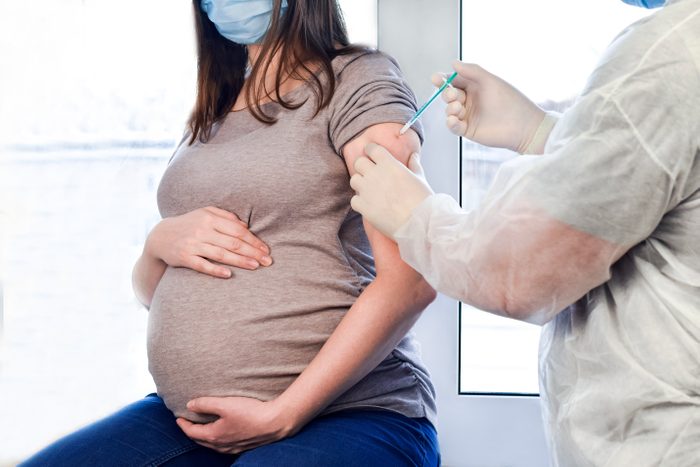Here’s What You Need to Know About COVID-19 Vaccines and Infertility

We spoke to an infectious disease specialist about whether the COVID-19 can affect your reproductive health.
Update: On Sept. 16, Pfizer-BioNTech and Moderna vaccines received full approval from Health Canada as well as new brand names. The Pfizer-BioNTech vaccine is now “Comirnaty,” the Moderna vaccine is now “SpikeVax” and the AstraZeneca vaccine is now called “Vaxzevria.”
While millions of Canadians are now partially or fully immunized against the novel coronavirus, some are still hesitant to receive the jab because of myths surrounding infertility and the vaccines.
So, what’s the deal? Can COVID-19 vaccines affect fertility?
The short answer is no. There is no evidence that COVID-19 vaccines (regardless of if you receive the AstraZeneca, Moderna or Pfizer-BioNTech shot) affect reproductive health. Dr. Cora Constantinescu, a pediatrician and infectious disease specialist at the Alberta Children’s Hospital in Calgary, sympathizes with Canadians’ concerns, particularly because individuals have no control over fertility issues. Add in rumoured risks of COVID-19 vaccines and the worry is completely understandable, she says.
We spoke with Constantinescu to get a better understanding of the harmful misinformation surrounding infertility and COVID vaccines, what prompted these fears and how to approach loved ones with fertility-related vaccine hesitancy. Here’s what we learned:
(Related: What You Need to Know About Blood Clots and COVID-19 Vaccines)
Let’s start at the beginning. What are the concerns about fertility and COVID-19 vaccines and where did these rumours come from?
For starters, misinformation about infertility and vaccines has been around long before the COVID-19 vaccines. “This phenomenon is not new and it’s very common among the vaccine hesitant and anti-vaccine people to point to fertility as a concern,” says Constantinescu. “Even for regular people who are just worried, it’s common to pick something that they have no control over [like fertility], but that is very worrisome to them and to escalate that fear.”
One of the most pervasive myths surrounding fertility and COVID vaccines came from a (since deleted) blog post that focused on how the Pfizer-BioNTech vaccine targets spike protein on SARS-CoV-2 (the virus that causes COVID-19). The post, written by a retired British physician and ex-Pfizer scientist who has been criticized for spreading vaccine misinformation, wrote that the COVID-19 spike protein is similar syncytin-1, a protein that’s crucial for keeping the placenta attached to the uterus during pregnancy. The post was shared widely on social media and Constantinescu says it prompted some to think, “if people have antibodies against the spike protein, they’re going to have antibodies against syncytin-1 too.”
This claim has been debunked by several medical societies. Constantinescu also references a recent Northwestern Medicine study published in the journal Obstetrics and Gynecology that compared 116 unvaccinated pregnant women to 84 women who received a COVID-19 vaccine during their pregnancy. The researchers found that the COVID-19 vaccine does not damage placenta.
(Related: How Everyday Products Can Affect Your Fertility)
What about pregnancy and the COVID vaccines?
Concern surrounding pregnancy and the vaccines stem from the fact that pregnant people weren’t included in any vaccine trials. The fear, explains Constantinescu, is that since pregnant people were excluded from the trials, they might experience unforeseen negative side effects.
“The problem with these large trials that happened very fast is that they comprised on vulnerable populations as to not compromise on safety on a grand scale,” says Constantinescu. Thankfully, in the U.S. alone, more than 123,000 pregnant people have been safely inoculated as of early June, and there continues to be no evidence that the vaccine causes fertility problems. “In fact, the most common side effects experienced by pregnant people are the same as the ones experienced by the non-pregnant—a very sore arm,” says Constantinescu.
On top of the mounting evidence showing no link between pregnancy complications and COVID vaccines, the shot can be extra beneficial if you’re expecting. Reports from around the world highlighted that pregnant individuals who contract COVID-19 are more likely to be admitted to intensive care and require ventilation. As a result, pregnant people have been prioritized for the vaccine in many Canadian provinces.
The simple message public health officials and healthcare professionals, including Constantinescu, want people to understand: Gaining immunity against COVID-19 will ultimately protect you if you’re pregnant, not harm you.
(Related: Get the Vaccine, Drop the Guilt)
What’s a good way to address the fertility myth with those who are vaccine hesitant?
Talking about COVID-19 and vaccines can definitely be a touchy subject. For many people who are vaccine hesitant, it’s a deeply personal issue. “This isn’t about ideologies,” says Constantinescu. “Often, it’s intensely emotional.”
Constantinescu suggests a three-pronged approach. First, build up common ground or bond with the person you’re talking to, such as sharing your own fears or previous misconceptions. Then, it’s important to hear them out and give them a chance to share their concerns, what they’re feeling and why they might be feeling that way. Finally, make sure you keep your conversation personalized and on-topic, avoiding talking about big picture arguments or philosophies. “So, if they’re concerned about fertility, then you just talk to them about their fertility concerns,” says Constantinescu.
(Related: How to Talk to Your Loved Ones About the COVID-19 Vaccines)
OK, so getting vaccinated is a smart choice, but what if you’re still nervous?
If you’re nervous about receiving your vaccine, prepare yourself by pre-empting your anxiety, advises Constantinescu. Share your concerns and fears with your healthcare provider to learn more about the latest evidence and guidance. In preparation for your appointment, do a little something for yourself to make the whole experience feel safer for you—even something as small as booking your vaccine appointment on a Friday so you have all weekend to decompress and ride out any side effects can help with feelings of anxiety. Even if you don’t experience any side effects or what you worried about never materializes, “the placebo effect is important,” says Constantinescu.
Next, here are 4 ways that the pandemic has affected our bodies.




